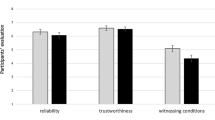Abstract
In the legal system, jurors are asked to render a decision after the event in question has already occurred and the final outcome, typically negative, is known. This “after-the-fact” structure of the legal system makes jurors susceptible to a human judgment phenomenon known as hindsight bias. This study focused on reducing hindsight bias in a courtroom context by incorporating a debiasing strategy within the defense's closing argument. Subjects viewed one of three videotaped versions of plaintiff and defense closing arguments in a commercial litigation case (i.e., foresight condition, hindsight condition, and hindsight debiasing condition). Results indicate that the hindsight debiasing strategy was effective in reducing subject-juror hindsight bias.
Similar content being viewed by others
REFERENCES
Agans, R. P., & Shaffer, L. S. (1994). The hindsight bias: The role of the availability heuristic and perceived risk. Basic and Applied Social Psychology, 15, 439–449.
Arkes, H. R. (1989). Principles in judgment/decision making research pertinent to legal proceedings. Behavioral Sciences and the Law, 7, 429–456.
Arkes, H. R. (1991). Costs and benefits of judgment errors: Implications for debiasing. Psychological Bulletin, 110, 486–498.
Arkes, H. R., Guilmette, T. J., Faust, D., & Hart, K. (1988). Eliminating the hindsight bias. Journal of Applied Psychology, 73, 305–307.
Caplan, R. A., Posner, K. L., & Cheney, F. W. (1991). Effect of outcome on physician judgments of appropriateness of care. JAMA, 265, 1957–1960.
Casper, J. D., Benedict, K., & Kelly, J. R. (1988). Cognition, attitudes and decision-making in search and seizure cases. Journal of Applied Social Psychology, 18, 93–113.
Casper, J. D., Benedict, K., & Perry, J. L. (1989). Juror decision making, attitudes, and the hindsight bias. Law and Human Behavior, 13, 291–310.
Cohen, J. (1977). Statistical power analysis for the behavioral sciences. New York: Academic Press.
Cohen, J. (1992). A power primer. Psychological Bulletin, 112, 155–159.
Davies, M. F. (1987). Reduction of hindsight bias by restoration of foresight perspective: Effectiveness of foresight-encoding and hindsight-retrieval strategies. Organizational Behavior and Human Decision Processes, 40, 50–68.
Devitt, E. J., Blackmar, C. B., & Wolff, M. A. (1987). Federal jury practice and instructions: Civil. (4th. ed.). St. Paul, MN: West Publishing.
Fischhoff, B. (1975). Hindsight ≠ foresight: The effect of outcome knowledge on judgment under uncertainty. Journal of Experimental Psychology: Human Perception and Performance, 1, 288–299.
Fischhoff, B. (1977). Perceived informativeness of facts. Journal of Experimental Psychology: Human Perception and Performance, 3, 349–358.
Fischhoff, B. (1982). Debiasing. In D. Kahneman, P. Slovic, & A. Tversky (Eds.), Judgment under uncertainty: Heuristics and biases (pp. 422–444). Cambridge: Cambridge University Press.
Hawkins, S. A., & Hastie, R. (1990). Hindsight: Biased judgments of past events after the outcomes are known. Psychological Bulletin, 107, 311–327.
Kamin, K. A., & Rachlinski, J. J. (1995). Ex post ≠ ex ante: Determining liability in hindsight. Law and Human Behavior, 19, 89–104.
Lord, C. G., Lepper, M. R., & Preston, E. (1984). Considering the opposite: A corrective strategy for social judgment. Journal of Personality and Social Psychology, 47, 1231–1243.
Lowe, D. J. (1992). An empirical examination of the hindsight bias phenomenon in evaluation of auditor decisions. (Doctoral dissertation, Arizona State University, Tempe, AZ (1992). Available from Dissertation Abstracts International, 53(07), A2444.
Pitera-Stallard, M. J. (1996). When jurors use the past to decide the future: A study to reduce hindsight bias in the courtroom. (Doctoral dissertation, University of Kansas, Lawrence, KS (1996). Available from Dissertation Abstracts International, 58(03), A9541447.
Sand, L. B., Siffert, J. S., Loughlin, W. P., Reiss, S. A., & Batterman, N. (1997). Modern federal jury instructions (Vol. 4). San Francisco: Matthew Bender & Co.
Schkade, D. A., & Kilbourne, L. M. (1991). Expectation-outcome consistency and hindsight bias. Organizational Behavior and Human Decision Processes, 49, 105–123.
Tversky, A. & Kahneman, D. (1982). Judgment under uncertainty: Heuristics and biases. In D. Kahneman, P. Slovic, & A. Tversky (Eds.), Judgment under uncertainty: Heuristics and biases (pp. 3–20). Cambridge: Cambridge University Press.
Wasserman, D., Lempert, R. O., & Hastie, R. (1991). Hindsight and causality. Personality and Social Psychology Bulletin, 92, 683–700.
Weir, S. S., Curtis, P., & McNutt, R. A. (1990). Expert testimony based on decision analysis: A malpractice case report. Journal of General Internal Medicine, 5, 406–409.
Wexler, D. B., & Schopp, R. F. (1989). How and when to correct for juror hindsight bias in mental health malpractice litigation: Some preliminary observations. Behavioral Sciences and the Law, 7, 485–504.
Wood, G. (1978). The knew-it-all-along effect. Journal of Experimental Psychology: Human Perception and Performance, 4, 345–353.
Wrightsman, L. S. (1991). Psychology and the legal system. Pacific Grove, CA: Brooks/Cole.
Author information
Authors and Affiliations
Corresponding author
About this article
Cite this article
Stallard, M.J., Worthington, D.L. Reducing the Hindsight Bias Utilizing Attorney Closing Arguments. Law Hum Behav 22, 671–683 (1998). https://doi.org/10.1023/A:1025706823554
Issue Date:
DOI: https://doi.org/10.1023/A:1025706823554




